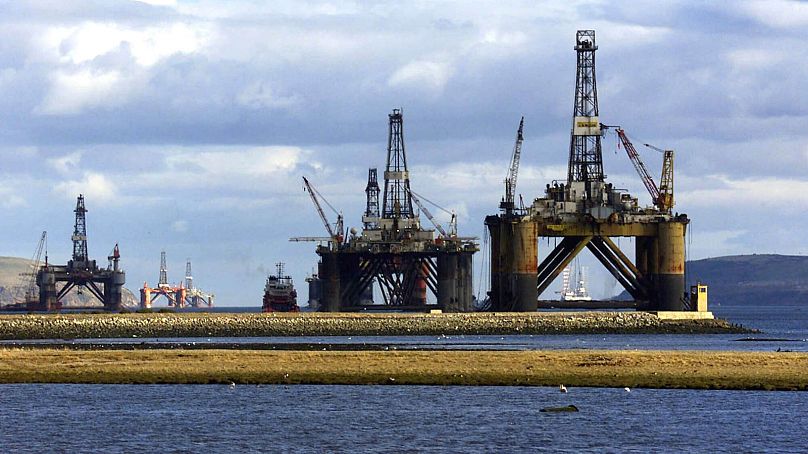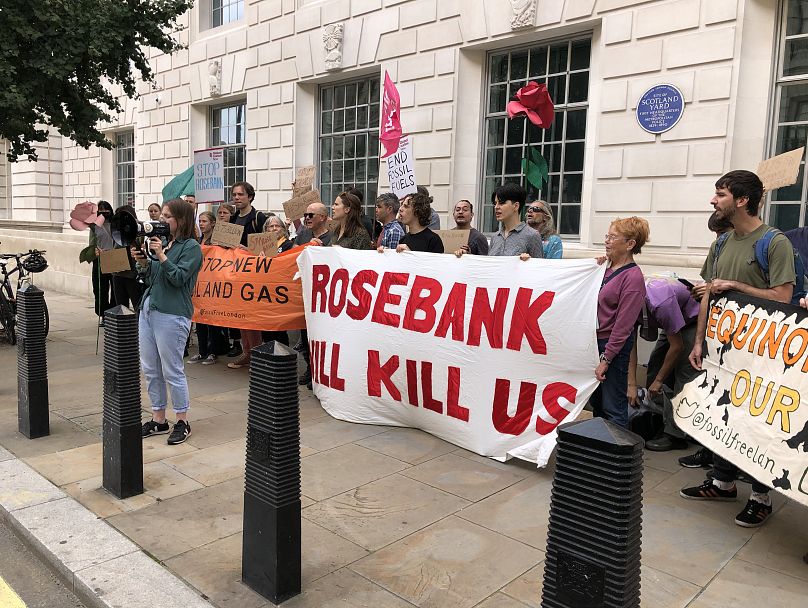The development could unleash the same annual emissions as 90 countries, prompting outrage from climate campaigners.
The largest untapped oil field in the North Sea has just been approved for drilling by the UK, despite repeated warnings that it is incompatible with a climate-safe future.
The Rosebank field off the coast of Shetland, Scotland is expected to produce more than 300 million barrels of oil and gas in its lifetime.
Burning these fossil fuels would release roughly the same annual emissions of around 90 countries and 400 million people, according to Carbon Brief analysis.
But Britain’s government and regulators have given the green light to the development, owned by Norwegian state energy firm Equinor and British oil and gas company Ithaca Energy.
“Now all Rishi Sunak’s anti net zero posturing makes sense,” says Joanna Warrington, spokesperson for Fossil Free London campaign group, referring to a series of climate policy U-turns by the Prime Minister last week.
“Approving Rosebank is a sickening failure, and Sunak’s Willow moment.”
Why has the UK government approved Rosebank?
The Conservative government has cited energy security as its priority in pushing ahead with the oil field development, in the face of criticism across the political spectrum.
"We will continue to back the UK’s oil and gas industry to underpin our energy security, grow our economy and help us deliver the transition to cheaper, cleaner energy," says Energy Security Minister Claire Coutinho.
Sunak has also said that Britain needs new domestic fossil fuels to improve energy security and that oil and gas would still feature in the country's energy mix even by 2050.
The North Sea Transition Authority, the UK regulator, said it had taken Rosebank's emissions into account in relation to Britain's climate plan.
The UK, which is the second biggest oil and gas producer in Europe after Norway, says it is still committed to reaching net zero by 2050.
Jobs are another stated reason for exploiting the UK's largest untapped oil field.
Oil and gas output from Britain's North Sea has been in decline for two decades, but the industry is still a big contributor to the economy, supporting 200,000 jobs. Ithaca Energy says Rosebank will underpin £8.1billion (€9.3bn) of direct investment in the UK and support up to 1,600 jobs during construction.
Last month, 50 MPs and peers from all major parties wrote to then Energy Secretary Grant Shapps urging him to block Rosebank. They voiced their concerns that the oil field could emit 200 million tonnes of CO2, and that taxpayers would be left shouldering the development cost.
Will developing Rosebank bring down British energy bills?
One thing that critics are adamant that Rosebank won’t do, is lower people’s energy bills.
Uplift, a campaign group which helped coordinate the Stop Rosebank movement, says Britain will struggle to benefit from Rosebank as most of the oil would be processed abroad.
“80% of Rosebank's oil [as with all North Sea oil] will be exported, so for those who think this will make a scrap of difference to the impending fuel poverty disaster that we are sleep-walking into this winter, you are wrong,” says Tessa Khan, Uplift’s executive director.
Mostly refined abroad, the oil will then be sold back to the UK at global market prices.
“Energy security and cheaper bills aren’t delivered by allowing highly subsidized, foreign-owned fossil fuel giants to extract more oil and gas from these islands and sell it overseas to the highest bidder,” says former Green Party leader and MP Caroline Lucas, calling the approval “morally obscene.”
Fossil Free London’s Joanna Warrington condemned the decision too. “New export-ready oil and gas that gets sold internationally is a disaster. What we need is bold action - renewables and rapid home improvements to insulate this country.
“We need Rosebank like we need a hole in the head.”
Campaigners fight back against Rosebank approval
The first production from Rosebank is expected in 2026-27. A general election in the UK is likely next year, but opposition party Labour has said it will respect any oil and gas licences granted before then if it wins, including for the Rosebank field.
Environmentalists are urging Labour - which otherwise wants to focus on clean energy - to rethink that stance. In the meantime, activists are taking to the streets to show that they will not back down in their fight to bury the development.
Fossil Free London and Stop Rosebank campaigners staged an emergency demonstration outside the government’s Department of Energy Security and Net Zero today, and will return on Saturday. “When we said the biggest field deserves the biggest fight we meant it,” says one campaigner in a new video from the group.
Tessa Khan, who is also a climate lawyer, says that a legal challenge could be mounted against the government.
“There are strong grounds to believe that the way this government has come to this decision is unlawful and we will see them in court if so,” she says. “We shouldn’t have to fight this government for cheap, clean energy and a liveable climate, but we will.”













